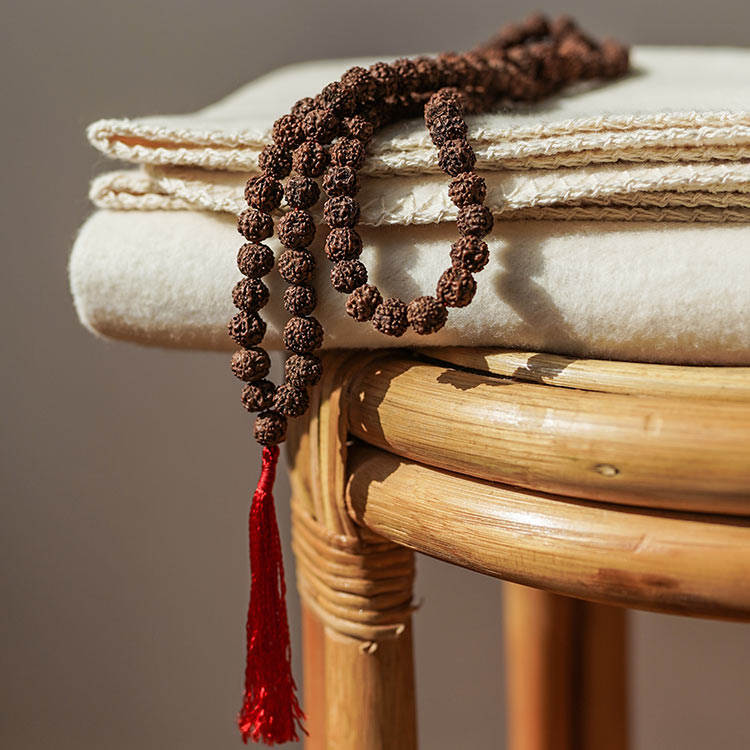
Sleep meditation for better sleep – the best tips
Sleep meditation for better sleep – what can you do?
Many people are completely exhausted from the day, yet many are unable to relax and unwind due to a thousand thoughts. This directly impacts their ability to fall asleep. Therefore, it's crucial that you find a routine that helps you find inner peace and calm. You should also make sure you're not overly stressed during the day. In this article, you'll learn why meditating before bedtime can help and why meditation is great in general.

What is meditation?
Those who are completely new to this field should first understand what meditation actually is. It's a method of letting go of your impulses, fears, and worries, becoming more aware of your feelings, and reaching a deeply relaxed state. This allows you to restore your body, mind, and soul.
Generally speaking, meditation is a state similar to when you are asleep. You are still fully here and you are always in control of your thoughts, yet your surroundings become slightly blurred; you enter a light trance state.
For many people, meditation is a way to unwind from everyday life and treat themselves to a moment of peace. Others use it to stop the carousel of thoughts.

The best advantages
Regardless of when you meditate, the state you enter is wonderful and restorative for your entire system.
Below you can see the most important benefits that come with regular meditation:
- You feel much more inner peace and relaxation.
- Your thoughts are no longer so stressful and you become more relaxed in general.
- Your nervous system relaxes.
- This can reduce stress.
- This allows you to let go of a lot of emotional baggage.
- Nerve cells can realign themselves with the help of regular meditation.
- This can increase focus, mindfulness and concentration.
Evening meditation: Why can this be so beneficial?

As you can see, consciously pausing for a moment has a multitude of positive effects. If you're feeling stressed in the evening, instead of watching TV, close your eyes and let your thoughts wander.
- After a long day, many people have countless thoughts in their heads, and these are usually already moving on to the next day's to-do list. This means your mind never feels at rest. If you go to bed with this carousel of thoughts, you'll hardly be able to fall asleep. Anyone who takes the time to do a short evening meditation will notice a difference almost immediately. Stressed people, in particular, should establish this as a routine.
- You can also use the few minutes of meditation to "think through" all your worries and insecurities so you can go to bed with a clear mind. In this context, it might be helpful to write everything down so you can let it all go.
- Suppressed feelings can surface through meditation. Therefore, it's very important that you accept everything that's present in the moment of meditation and don't push it away. If you need to cry, that's perfectly fine; if you get angry, you can also accept those feelings.
- Meditation can help you draw a clear line between work and leisure time. Therefore, it may be advisable to meditate right after you get home. You don't necessarily have to do it a few minutes before bedtime.
- When you meditate, you can increase your concentration, which in turn has a positive effect on your thoughts. This allows you to more consciously decide which thoughts you want to think before going to sleep and which you don't.
What meditations can you do?
You can decide each evening which meditation is right for you. There are a variety of guided meditations you can do every day. You can find these on CDs, on YouTube, or in meditation courses. If you prefer free meditation, you can try the following tips:
a) Pay attention to your body (body scan)
This is a great way to become aware of your own body and achieve a better sense of body awareness. For this meditation, sit or lie down on your yoga mat and relax. Now begin to "scan" your body from top to bottom. Ask yourself the following questions:
- How do certain areas of your body feel (back, neck, legs, arms, etc.)?
- Where do you feel tight?
- Where can one see the vastness?
- Do you have any pain anywhere?
You'll notice that you become significantly calmer and more relaxed. Your body, mind, and soul will recover well, and you'll strengthen your health.
b) Focus on breathing

If you want to practice a simple yet highly effective meditation technique, simply concentrate on your breath. Feel yourself inhaling through your nose, feeling the breath reach your belly, and exhaling again. Repeat this process for a few minutes. You'll notice that you become much calmer and your sleep improves significantly.
Pay attention to:
- A comfortable sitting position on your meditation cushion
- Relax your body, face, jaw, shoulders and neck
- Try to focus fully on your inhalation and exhalation
- When your thoughts wander, always return to your breath

What additional tips can help you find more peace of mind?
In addition to the tips above, you can also consider the following points:
- Be sure to turn off your phone, tablet, or TV at least an hour before bedtime. This will avoid exposure to blue light, which can negatively impact your sleep quality.
- Essential oils or incense blends can help you drift off to sleep even more easily. Valerian, rose, chamomile, lavender, neroli, or cedarwood are soothing and bring calm to your system.
- When meditating, it's important to ensure you're in a quiet environment. This has an additional relaxing effect and is important for preparing you for restful sleep.
If you follow these tips and meditate daily, you will notice that you can fall asleep much better.
Have you tried meditating in the evening? If so, how was it for you? Did you notice any changes?
Share







